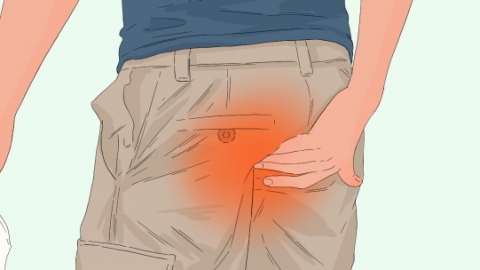What causes rectal bleeding and anal pain?
Bleeding during bowel movements and anal pain are generally caused by imbalanced diet, poor defecation habits, anal fissures, thrombosed external hemorrhoids, perianal abscesses, and other reasons. It is recommended to seek medical attention promptly, identify the underlying cause, and receive symptomatic treatment under a doctor's guidance. Specific analysis is as follows:

1. Dietary Imbalance: Long-term consumption of spicy and irritating foods combined with insufficient dietary fiber can lead to hard stools that may injure the anal mucosa. Adjust your diet by eating more fiber-rich foods such as celery, spinach, and apples, drink plenty of water, and avoid irritants like chili peppers and Sichuan peppercorns.
2. Poor Defecation Habits: Prolonged squatting on the toilet or excessive straining during bowel movements increases local anal pressure and may cause injury. Develop regular bowel habits, limit each bowel movement to within five minutes, and avoid using mobile phones or straining excessively while defecating.
3. Anal Fissure: Hard stools forcibly passed during defecation can tear the skin of the anal canal, causing severe anal pain during and after bowel movements, often accompanied by bleeding. Follow medical advice to use medications such as glyceryl trinitrate ointment, compound azulene cream, or erythromycin ointment. Perform warm water sitz baths after bowel movements to relieve discomfort.
4. Thrombosed External Hemorrhoid: A blood clot forms within the external hemorrhoidal venous plexus, leading to sudden anal swelling and pain, with bleeding easily triggered during bowel movements. Medications such as micronized purified flavonoid extract tablets, diosmin tablets, or melilotus tincture tablets may be taken as directed. If necessary, a thrombectomy may be performed to directly remove the clot and relieve pain.
5. Perianal Abscess: Infection of the anal glands leads to acute suppurative inflammation around the anus. Bleeding may occur when the abscess ruptures, accompanied by persistent anal distension and pain. Antibiotics such as cefixime dispersible tablets, metronidazole tablets, or levofloxacin tablets should be used according to medical advice to control infection. Surgical incision and drainage of the abscess are required to evacuate pus and promote healing.
Maintain cleanliness and dryness of the anal area in daily life. Gently wipe with soft toilet paper after bowel movements and avoid using coarse sanitary paper. Choose loose, breathable cotton underwear and wash and change them frequently. Perform appropriate pelvic floor (Kegel) exercises regularly to strengthen the function of the anal sphincter muscles and reduce the risk of anorectal diseases.






